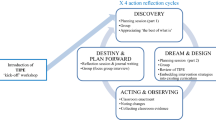Abstract
Research on teacher formation emphasises the need for teachers in Catholic schools to be involved in ongoing, purposeful, professional and spiritual formation (Franchi and Rymarz 2017). Contextually, Catholic Education Western Australia (CEWA) requires teachers of Religious Education (RE) in Catholic schools to participate in ongoing professional development, including opportunities for spiritual and faith formation. This paper presents initial findings from a project that engaged twelve Catholic early childhood RE teachers from one Western Australian school in a series of formative sessions. The project was named The T.I.T.U.S. (Testament In Teachers Using Scripture) Project and comprised four sessions that offered teachers opportunities for spiritual and faith formation through the use of Scripture. A qualitative approach to the research design was employed and data gathered included survey, journaling and semi-structured interviews. Data were analysed through a process of thematic coding. The initial findings provide insight into early childhood RE teachers’ perspectives of their own spiritual and faith formation.


Similar content being viewed by others
References
Adams, K., Bull, R., & Maynes, M. (2016). Early childhood spirituality in education: Towards an understanding of the distinctive features of young children’s spirituality. European Early Childhood Education Research Journal, 24(5), 760–774. https://doi.org/10.1080/1350293X.2014.996425.
Anderson, C. (2010). Presenting and evaluating qualitative research. American Journal of Pharmaceutical Education,74(8), 1–7.
Arbuckle, G. A. (2016). Intentional faith communities in Catholic education: Challenge and response. New South Wales, Australia: St Pauls Publications.
Babbie, E. (2016). The Practice of Social Research (14th ed.). Canada: Cengage Publishing.
Byrne, M. (2001). Disseminating and presenting qualitative research findings. AORN Journal,74(5), 731–732.
Caldwell, E. (2015). The aesthetic dimension in faith formation. Religious Education,110(5), 472–475. https://doi.org/10.1080/00344087.2015.1089708.
Carswell, M. (2018). Teaching scripture: Moving towards a hermeneutical model for religious education in Australian Catholic schools. Journal of Religious Education,66(3), 213–223.
Catholic Education Commission of Western Australia. (2009). Mandate of the Catholic Education Commission of Western Australia 2009–2015. Perth, WA: Author.
Catholic Education Commission of Western Australia. (2017a). Accreditation policy. Retrieved from https://www.cewa.edu.au/policy/accreditation/
Catholic Education Commission of Western Australia. (2017b). Religious education policy. Retrieved from https://www.cewa.edu.au/policy/religious-education/
Coll, R. (2006). Faith formation in the context of continuing professional development for Catholic teachers: Understanding the views of managers. Journal of In-service Education,32(4), 431–450. https://doi.org/10.1080/13674580601024499.
Congregation for Catholic Education. (1988). The religious dimension of education in a Catholic school. Retrieved from https://www.vatican.va/roman_curia/congregations/ccatheduc/documents/rc_con_ccathe duc_doc_19880407_catholic-school_en.html
Congregation for the Clergy. (1997). General directory for catechesis. Retrieved from https://www.vatican.va/roman_curia/congregations/cclergy/documents/rc_con_ccatheduc_doc_17041998_directory-for-catechesis_en.html
Creswell, J., & Creswell, J. D. (2018). Research design: Qualitative, quantitative and mixed methods approaches (5th ed.). California: SAGE publications.
Crowley, E. D. (2014). Using new eyes: Photography as a spiritual practice for faith formation and worship. Dialog: A Journal of Theology,53(1), 30–40.
Dean, A. M. (2015). Spiritual formation and grace. Compass,49(1), 16–20.
De Souza, M. (2016). Spirituality in education in a global, pluralised world. New York: Routledge Research in Education.
Douglass, K. M. (2013). Aesthetic learning theory and the faith formation of young adults. Religious Education,108(5), 449–466. https://doi.org/10.1080/00344087.2013.835637.
Franchi, L., & Rymarz, R. (2017). The education and formation of teachers for Catholic schools: Responding to changed cultural contexts. International Studies in Catholic Education,9(1), 2–16.
Giesenberg, A. (2007). The phenomenon of preschool children’s spirituality. [Doctoral Thesis]. Retrieved from https://eprints.qut.edu.au/16519/1/Anna_Giesenberg_Thesis.pdf.
Grajczonek, J. (2013). The early years religion program: Placing the emphasis on how young children learn. Religious Education Journal of Australia,29(2), 3–8.
Hackett, C., & Lavery, S. D. (2012). Formation of pre-service teachers for religious education through experiential learning: The retreat leaders training program. Journal of Religious Education,60(2), 13–23.
Hay, D., & Nye, R. (1998). The spirit of the child. London: Harper Collins.
Hess, M. E. (2014). A new culture of learning: Digital storytelling and faith formation. Dialog: A Journal of Theology.,53(1), 12–22.
Hyde, B. (2010). Godly Play nourishing children's spirituality: A case study. Religious Education,105(5), 504–518.
Keeble, N., & Burton, N. (2013). Can reflective storytelling be a significant educational pedagogy in key stage 2? Education 3–13,41(1), 5–14.
Kervin, L., Vialle, W., Herrington, J., & Okely, T. (2006). Research for educators. Victoria, Australia: Thomson Social Science Press.
Law-Davis, S., Robinson, C., Fic, J. & Mola, R. (2019). Pre-service teachers’ perspectives on teaching scripture in primary religious education. eJournal of Catholic Education in Australasia 3(1), 1–22.
Miles, M., Huberman, A. M., & Saldana, J. (2014). Qualitative data analysis: A methods sourcebook (3rd ed.). California: SAGE Publications.
National Catholic Education Commission. (2017). A framework for formation for mission in Catholic education. NSW: National Catholic Education Commission.
Neuman, L. W. (2011). Social research methods: Qualitative and quantitative approaches (7th ed.). Boston: Pearson.
Nouwen, H. C. M., & Laird, R. (2006). Spiritual direction: Wisdom for the long walk of faith. New York: HarperOne.
Power, M. M. (2010). Narrative fiction and the ethical imagination of children: A preliminary study. Journal of Religious Education,58(3), 52–58.
Rossiter, G. (2011). Some perpsectives on contemporary youth spirituality: A ‘need to know’ for church school religious education. Religious Education Journal of Australia,27(1), 9–15.
Rossiter, G. (2012). Reflections on issues for children’s spirituality and primary school religious education. Journal of Religious Education,60(30), 14–24.
Steibel, S. R. G. (2010). Chistian education and spiritual formation: One and the same? Christian Education Journal, 7(2), 340–355.
Thompson, R. (2009). Scriptures, worldview and education: Living the story in a new era. Christian Teachers Journal,17(3), 4–9.
Yin, R. (2016). Qualitative research from start to finish (2nd ed.), New York: The Guildford Press.
Yount, W. R., & Blevins, D. G. (2012). The role of scripture in Christian education Session 1: Scripture as the structural steel of Christian education. Christian Education,3(9), 30–52.
Author information
Authors and Affiliations
Corresponding author
Additional information
Publisher's Note
Springer Nature remains neutral with regard to jurisdictional claims in published maps and institutional affiliations.
Rights and permissions
About this article
Cite this article
Fic, J., Robinson, C. Early childhood teachers’ spiritual and faith formation experiences: initial findings from The T.I.T.U.S. Project. j. relig. educ. 68, 91–106 (2020). https://doi.org/10.1007/s40839-020-00096-5
Published:
Issue Date:
DOI: https://doi.org/10.1007/s40839-020-00096-5



